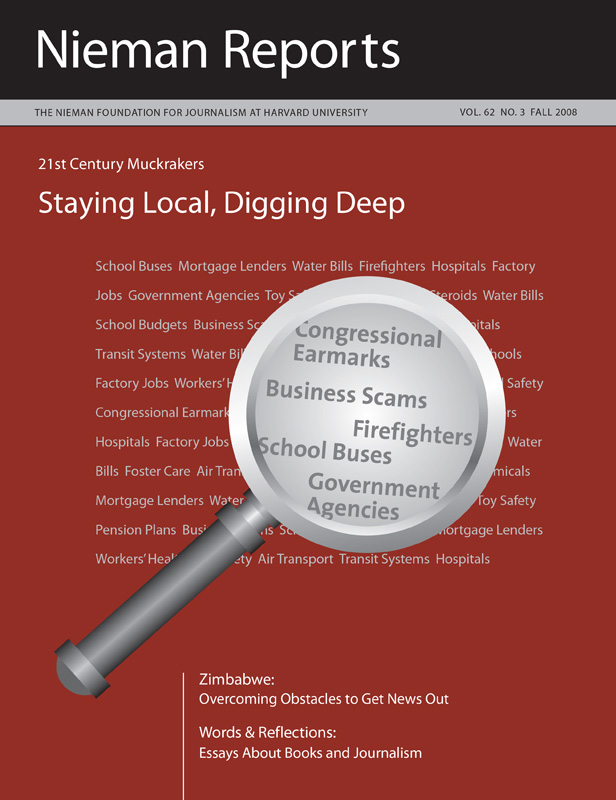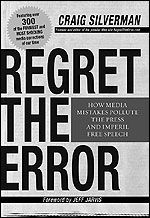Just after seven on a Sunday morning, a message from a young woman who was to be married within hours landed in the readers’ e-mail box at The New York Times. Subject: You Ruined My Wedding Day!
In its weddings pages that morning, the Times had misspelled the surname of the woman’s husband-to-be. “At least you were consistent,” she wrote. “It was misspelled in the headline and in the announcement.” As I read her note, I kept thinking: Please let this be a parody of the parody that “Sex and the City” did of the Times’s wedding announcements—the episode in which Charlotte opens the Sunday paper to find that an ink splotch on her wedding photograph makes it appear that she has a moustache.
But in this case, we had a real-life Charlotte, not a reader playing a prank, as sometimes happens. As the editor who oversees corrections for the Times, I apologized to the young woman and assured her that we would promptly correct the error online and in the print edition the next Sunday.
I knew, of course, that the bride’s message was merely the first of hundreds the Times would receive that day and throughout the week. The messages and telephone calls come fast (and mostly furious):
- How can the best paper in the country keep misspelling the attorney general’s name?
- How could you write such a headline? “McCain Claims Victory as Democrats Duel in Iowa and Texas.” Is it proverbial parochialism that prevents you from knowing the difference between Iowa and Ohio?”
- How could someone born in 1915 be 81 years old in 2007? Even my second grader can subtract!
At the Times, we ask tough questions, too: How could such an error happen? How did it happen? How do we keep it from happening again? Unfortunately, we must come up with answers while publishing the Times 24/7, but in doing this it’s our good fortune to have Craig Silverman on our side—and watching us 24/7. Silverman is a journalist and founder of RegretTheError.com, a Web site that compiles media errors. And now he is the author of “Regret the Error: How Media Mistakes Pollute the Press and Imperil Free Speech.”
Journalists and news organizations who continue to brushoff readers’ complaints or issue terse “we stand by our story” statements will no doubt find the subtitle of Silverman’s book a bit overdramatic. That’s unfortunate because the book, which includes more than 300 funny and shocking corrections, is on target with its broader message and could not be more timely.
Newspapers, and other media as well, are losing more than their stock value these days. By ignoring readers’ pleas for accuracy and accountability, journalists are losing the most valuable asset: their credibility. Silverman says it best: “It is accurate news that matters most to society. The desire for factual information is an inseparable component of news and has emerged as the foundation of modern journalism .… Accuracy is at the core of how the media builds trust.”
Digital Media: Accuracy and Accountability
Silverman observes in his book that The New York Times has led the way for several decades in striving for accuracy and in setting the record straight. He credits a former executive editor of the Times, A.M. Rosenthal, with creating in the 1970’s what many consider the modern newspaper correction—at least in print. There are days we wish we had Rosenthal around so we could say: Here, create a new model for corrections to serve us for another 35 years—this time with the new demands of digital media in mind.
If Rosenthal were around to take up that challenge, he would have plenty of help—from the outside. Each day brings another blogger or another Web site dedicated to correcting the Times’s errors. We welcome these, just as we ask readers to let us know when they spot an error. And like many readers, some bloggers are thorough in their research. But many post items before they check, only to learn later that they were wrong about the Times making an error. This lack of fact checking extends to Web sites that monitor media errors. Few ask for an explanation or response from us before telling the world that the Times was wrong. Media Matters for America is one that does do its reporting first. This adds to its credibility—and reduces the odds that it will have to acknowledge its own error.
But bloggers overall are increasingly correcting their own errors, as Silverman notes, and they are finding innovative ways to do so. At the Times, we have struggled for more than a year to develop a system for correcting and acknowledging online errors. From a practical standpoint, correcting every error that flashes on our Web site for even five minutes is a logistical nightmare. But Silverman, rightly, cuts the print media and their online sites no slack for using “the lack of resources” as an excuse for not doing what we manage to do each day in print.
Nor does merely correcting what was wrong in a given article appease readers. They want us to acknowledge that we made the error. The Times does this by adding a note at the bottom of any article that has been corrected, but other readers agree with Silverman that we need a feature on our Web site that lists, in one place, all of the online articles that have been corrected. We’re working on it.
Of course, the Times compounded its online problems when it opened its archives, dating from 1851, to the public. Every day brings several e-mail messages from readers asking for a correction. Some are simple: “I thought I would look through your archives today to see if you ever misspelled Pervez Musharraf. It has been “Musharaff” seven times since 2002. Please correct.” (We invoke our arbitrary statute of limitations on ones like this. No correction.)
Other errors that will live for eternity—thanks to Google—are more serious. “You wrote in 1987 that I was charged with a bank robbery. The charges were dropped. Please correct this. You are ruining my life! I can’t get a job!” (With official documentation, the Times now appends a note to the article if a case we reported involved felony charges that were dropped.) Still other readers trolling the archives want us to correct what might be considered their mistakes: “Please correct my wedding announcement in 1992. I am no longer married to that sorry excuse for a husband.” (The announcement was accurate at the time, so no correction is warranted.)
Now, every time I receive another request to correct the status of a marriage—there are many—I wonder if I will hear again from the young bride who wrote us that Sunday morning. (Of course, I hope I don’t.) I did hear from her father later that Sunday afternoon. He wrote: “It seems that my daughter was so upset this morning about the misspelling of her fiancé’s name that she did not notice that you referred to me as her ‘late father.’ I just wanted you to know that I am indeed alive and attended the wedding. It was a great day—in spite of the Times.”
We sent the couple a belated wedding gift: corrected page proofs, both full-size ones on newsprint and smaller glossy ones. This gesture cost us almost nothing, but it earned us a great deal of goodwill—and hopefully restored their trust in us.
Greg Brock, a 1994 Nieman Fellow and senior editor at The New York Times, has made his share of errors—including editing mistakes into three corrections. (He ran corrections on all three.)



